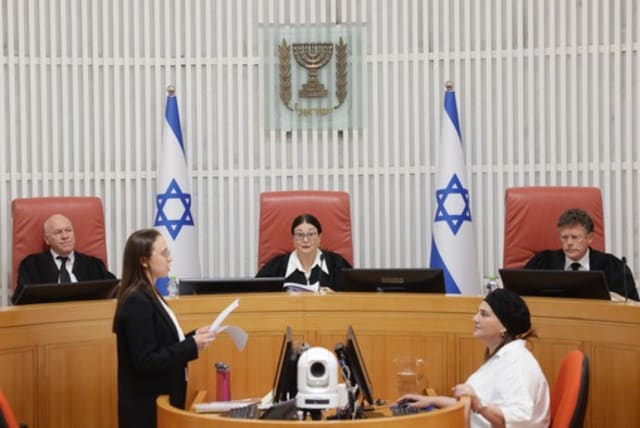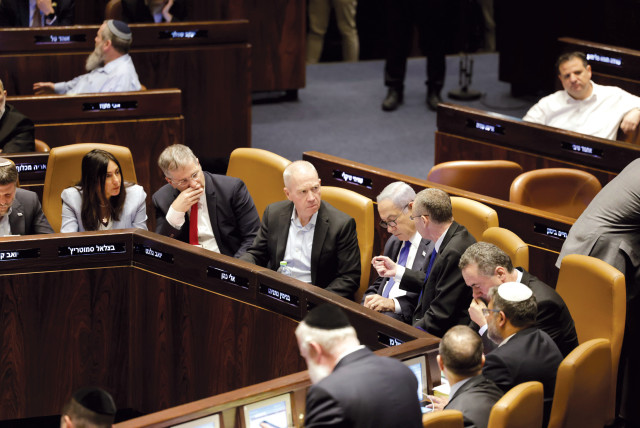Gov't demands High Court postpone reasonableness clause hearing

If postponed, the hearing may come at a time when High Court President Esther Hayut and a justice are set to retire.
The hearing for the judicial reform’s reasonableness standard law should be delayed by at least 21 days to allow for the government to build its case, coalition attorney Ilan Bombach argued in a letter to the High Court of Justice on Friday, a request that could put time pressure on justices set to retire in October.
Bombach asked that the September 12 hearing for the reasonableness law hearing be deferred by at least three weeks, which would push the hearing into October and possibly in contradiction with the tail end of the High Holy Days.
High Court President Esther Hayut is set to retire in October, turning 70 on October 16. Justice Anat Baron will also retire that month, reaching the retirement age for justices on October 12.
While Justice Yitzhak Amit is expected to assume the court presidency, filling the seats has been brought into question by Justice Minister Yariv Levin’s refusal to convene the Judicial Selection Committee. A hearing has been set for petitions calling for the panel’s assembly for September 7.
Bombach also requested in the letter a deferment for the respondents’ answers to the petitions. Currently, the respondents must file a response to the petitions by September 3, but Bombach is asking for a five- to seven-day extension.
He said there are eight different petitions that lay out a wide variety of arguments, and it had been only officially decided on Tuesday that the Attorney-General’s Office would not be representing the coalition, leaving Bombach with a short window to prepare.
To properly respond to the array of challenges, detailed on hundreds of pages submitted by the myriad of petitioners, the coalition lawyer needed more time.
While the attorney-general usually represents government officials in court, in rare and exceptional occasions such as the historic reasonableness hearing, outside representation may be approved.
On Wednesday, Attorney-General Gali Baharav-Miara said in a letter that she would allow Levin outside representation because of the gulf in approach on the reasonableness law.
Why should the High Court postpone the hearing?
Bombach wrote that in a phone call last Tuesday, Baharav-Miara told Levin that she would also not be able to represent the government or Prime Minister Benjamin Netanyahu.
Bombach argued that the breadth and depth of the arguments, as well as the extreme sensitivity and historic importance of the approaching hearing, demanded that the process not be rushed. Especially so, he said, since the court had already issued a conditional order to consolidate the discussions into one hearing.
It was not in the best interest of the public to hurry the proceedings, and it would not harm that interest to delay the hearing. The current hearing date would put on unsteady ground the petitioners’ central argument that the Knesset had not properly exercised its constitutional authority because it rushed passing the basic law amendment, while also rushing a hearing on that same legislation.
The High Court has never before struck down a Basic Law amendment, and it is hotly contested if it has the power to do so, though the court has expressed that it is indeed within its ability. Bombach argued that the unprecedented push for judicial review over Basic Laws needed extra time for him to sufficiently address.
Bombach also made a personal plea, noting that his son’s wedding was also scheduled for the evening of September 12, so he needed to know in advance if he would need to postpone the event.
A historic full bench of 15 justices would preside over the hearing. Right-wing activists have challenged Hayut’s ability to sit on the bench, arguing that she has already expressed a bias against the judicial reform. Last Sunday, a petition by the Lavi NGO calling for Hayut to sit out the hearing was rejected by the court.
The reasonableness standard law, passed on July 24, restricted a common law doctrine that allowed for judicial review of government administrative decisions deemed far beyond what a reasonable and responsible authority would allow. The court is no longer allowed to review administrative decisions by the prime minister, ministers, and full government. Civil servants would still be subject to the reasonableness law.
The law is part of the judicial reform proposed by Levin in January, and has been met by mass protest nationwide.
On Saturday, for the 33rd straight week, thousands of protesters gathered in Tel Aviv, Haifa, Jerusalem, and other locations around the country to demonstrate against the government’s judicial reform plans.
At the main protest in Tel Aviv, a moment of silence was held for the victims of the Huwara terror attack earlier that day.
In addition to the reasonableness legislation being an abuse of the Knesset’s authority and advanced through improper procedure, the petitioners have argued for the court to view the law as part of a broader agenda that would upend Israel’s democratic system and values.
Jerusalem Post Store
`; document.getElementById("linkPremium").innerHTML = cont; var divWithLink = document.getElementById("premium-link"); if (divWithLink !== null && divWithLink !== 'undefined') { divWithLink.style.border = "solid 1px #cb0f3e"; divWithLink.style.textAlign = "center"; divWithLink.style.marginBottom = "15px"; divWithLink.style.marginTop = "15px"; divWithLink.style.width = "100%"; divWithLink.style.backgroundColor = "#122952"; divWithLink.style.color = "#ffffff"; divWithLink.style.lineHeight = "1.5"; } } (function (v, i) { });

